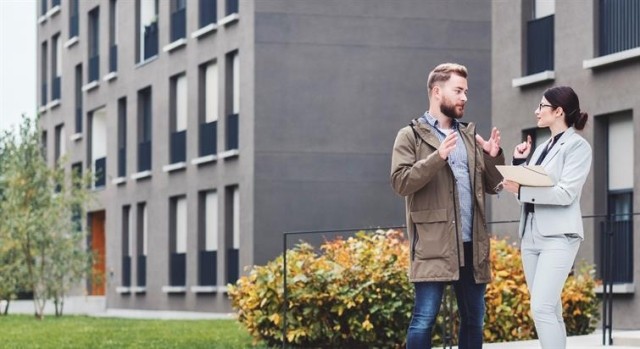To renew or not renew – this is the decision renters must face when their lease comes to an end. For some, renewing their lease is a no-brainer. For others, it involves weighing factors like renewal rate, lease agreement terms, and other personal circumstances to come to a decision.
As a renter, it’s important to consider all your options before choosing to end or renew a lease. Whether you’re a first-time renter or a seasoned veteran, we’ve compiled a guide about all things lease renewals to ensure you make the right choice for your next chapter.
What Happens When Your Lease Ends?
When your lease ends, you’ll have three different courses of action to choose from: renew, extend, or terminate. There’s no right or wrong option when dealing with lease renewals. However, certain routes might make more sense for you depending on your budget, living experience in the property, relationship with your landlord, and other external factors like location, lifestyle, etc.
Renew a lease
If you choose to renew, you’ll enter a new lease at your current property. This lease will likely have the same terms as your previous one, with the only exception being a slight change in monthly rent. According to CoStar Group, apartments tend to raise their market rent by 2-5% yearly. That said, you’ll want to consider your monthly budget before committing to a renewal.
In some cases, you can negotiate rent with your property manager or landlord. While it might not always be successful, negotiating rent is usually worthwhile if you’re set on staying in your current unit. Along with rent, lease terms are also negotiable. Perhaps you want to revise pet policies or maintenance services. Your renewal period is the perfect time to air all these grievances so that you can ensure your next lease works for you.
Your landlord or property manager will notify you 90 days before your lease ends with a renewal letter. In this letter, they will disclose your renewal rate and lease terms changes if applicable. They will then ask that you either sign the new lease and return it to them or notify them quickly if you’re not renewing. Most landlords will require at least a 30-60-day notice if you’re not renewing, giving you about a month from their initial notification to make your decision.
Extend a lease
Like renewing, extending a lease means you will stay put. However, it will be for less time than a full-term lease. This is a great option if you’re looking for something more short-term rather than a full-year commitment. You might choose to extend instead of renew for many reasons, such as job uncertainty, financial fluctuations, or upcoming life changes.
In some cases, you might extend your lease because your landlord can’t offer you a full lease term. This could be because they need the home empty for extensive renovations or plan to sell the property. If this is the case, you could request a month-to-month extension to give yourself more time to find a new place.
A month-to-month lease agreement is unlike a fixed-term agreement, meaning you won’t have a set monthly rent. Instead, your rent might fluctuate every 30 days, with some months being cheaper and some being more expensive. Though these types of lease agreements are nice for temporary stays, they’re not sensible if you’re looking to settle down long-term. In fact, you might be able to find a cheaper short-term lease elsewhere than what you’d pay on a month-to-month basis.
Terminate a lease
If you’ve opted out of both a lease renewal and a month-to-month rental agreement, then your final option is to terminate your lease and find a new rental. Terminating your lease means moving out of your current place when your lease ends. However, ending a lease doesn't always have to be on bad terms.
While some renters terminate because of issues with the property or hefty rent increases, others have completely unrelated reasons. You may have a new job and need to relocate. Or perhaps you’re ready to stop renting and buy a property. Whatever your reason may be, just remember that terminating a lease requires proper notice and can come with fees if not done correctly. So, make sure to review your lease agreement and local laws before you choose this option. Most landlords require a written notice to vacate at least 30-60 days before the end of your lease.
What Should You Consider Before Renewing Your Lease?
There’s a lot to consider when renewing a lease. While you might love your current unit, external factors may influence your decision to stay. Maybe your current location is no longer convenient for your lifestyle, or your rent is increasing beyond your budget. Before renewing, you should consider the following factors:
Cost changes
As mentioned earlier, rent increases are to be expected with lease renewals. If your landlord increases rent substantially, you’ll need to re-evaluate your budget to see if you can comfortably accommodate the potential increase. That, or you can try to negotiate the price. If neither of those options work, you might have no other choice but to forgo renewal.
Location convenience
Location is another huge factor when it comes to lease renewals. If your office commute is short and you are near good amenities like grocery stores, parks, and restaurants, then there’s probably no reason to leave. However, if you’ve changed jobs or lifestyle habits, you might want to relocate to somewhere that better fits your needs.
Property condition
Before you renew, consider your property’s current condition. Are there any unresolved maintenance issues? Does the unit need renovations? How promptly and effectively has your landlord addressed past maintenance requests? Asking these questions will allow you to properly evaluate your property’s condition and determine if it can sustain another full-team lease.
Relationship with landlord
Your relationship with your landlord can make or break your living experience. If your landlord has been responsive to your needs, upfront about inspections and lease terms, and respectful of your space, renewing is probably worthwhile. However, if you’ve had ongoing issues or conflicts with your landlord, it might be best to cut ties and terminate.
Personal circumstances
Lastly, you should take personal circumstances into account before renewing a lease. Maybe you plan to get a pet soon and need to move to a pet-friendly rental. Or perhaps you’re moving in with a significant other and need a bigger space. Personal circumstances like these will likely sway your decision and should be carefully considered before re-signing.
Do Rent Concessions Continue if You Renew a Lease?
When you signed your first lease, you might’ve received one or more rent concessions. A rent concession is a temporary offer from a property manager or landlord to attract or retain a renter. For example, your landlord might’ve offered one month of free rent when you first signed your lease. However, this doesn’t mean you’ll get another free month when renewing.
Though rent concessions are a great way to get renters on board initially, they don’t always apply in lease renewals. If you’re concerned about losing your rent concessions when renewing, be sure to talk to your landlord or property manager before re-signing. Though they might not be able to offer you the same concession, they could offer you an alternative. Just like negotiating price or lease terms, requesting rent concessions during renewal is always worth a shot.
Do You Get Your Security Deposit Back?
If you’ve decided not to renew, you can expect to potentially receive money back when you move out. Your security deposit and pet deposit, if applicable, are refundable and will be returned to you if you’ve kept the rental in good condition.
Some landlords will go out of their way to find reasons to keep a security deposit. In this case, you’ll want to ensure you restore the property to move-in-ready condition before moving out. To restore your rental and secure the return of your security deposit, you’ll want to:
- Thoroughly clean your apartment, from the floor to the ceiling fans
- Make any and all repairs to the damage you caused, such as holes in the wall
- Be present during your move-out inspection
- Return your keys, including your mail key, keycard, gate fob, etc.
- Review the photos you took during your move-in walk-through to compare the condition of the rental
- Provide a forwarding address to ensure the return of your deposit and any future correspondence
On the other hand, if you choose to renew or extend your lease, your landlord will likely continue to hold onto your security deposit until you move out. In this case, any damages or issues with the unit might affect whether you receive all or part of your security deposit back when you eventually do leave the unit.
After Your Lease Ends
When it comes down to it, you have three logical options for what to do when your lease is up. You can renew your lease for another term, agree to a month-to-month lease, or move out of your apartment (with proper notice) and find a new rental. Do your research on the cost of rent in the area, decide your budget, determine potential moving costs, and ultimately figure out which option is best for your living situation.
We hope this guide has helped you make an informed decision about your lease renewal. Remember to carefully evaluate all factors before making a final decision, and always communicate with your landlord or property manager throughout the process. Best of luck, renters!
This article was originally published on September 19, 2019, by Megan Bullock.
FAQs
Can I stay in my unit after the lease ends without signing a new lease?
No, unless you've agreed to a month-to-month lease. Otherwise, if you stay without signing a new lease or extension, you will be considered an illegal occupant and could face eviction.
How long can I stay in my unit after the lease expires?
The duration you can stay after your lease expires depends on your landlord's policies and any agreements made. Generally, it's best to clarify this with your landlord before your lease ends.
Can my landlord raise the rent if I renew my lease?
Yes, your landlord can raise the rent upon renewal of your lease, but they must provide notice according to local laws. If you feel the increase is unreasonable, you can try to negotiate with your landlord or explore other housing options.
What happens to my security deposit if I do not renew my lease?
If you do not renew your lease, your security deposit should be returned, minus any deductions for damages, as stipulated in the lease agreement. However, be sure to thoroughly clean and restore the property before you move out to ensure the return of your deposit.
Can I negotiate rent or lease terms during a renewal period?
Yes, lease terms such as pet policies, maintenance services, and lease length can also be negotiable. Your renewal period is an excellent opportunity to bring up any concerns or requests regarding these aspects of your lease. Remember to do so respectfully and provide reasonable justifications for your requests.






